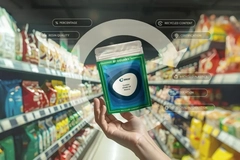Plastic energy crisis: European converters warn surging polymer costs could kill industry
.png)
17 Nov 2021 --- Plastics converters are facing a sharp rise in costs as major polymer producers incur surcharges from soaring energy prices throughout Europe. Trade associations warn of impending chaos, economic devastation and worsening environmental pollution if the situation is not addressed.
A number of unforeseen circumstances, including drastic weather disruptions and the COVID-19 pandemic, have done serious harm to the European plastics industry in the past two years, according to the Polymers Alliance for Europe (PEA).
PEA was established by the European Plastics Converters association (EuPC) during its General Assembly in May 2015 – a year when an “exceptional level of forces majeures” brought the plastics conversion industry together to form protective measures for its 1.6 million European workers.

PackagingInsights speaks with Ron Marsh, PEA chairman, about how political and environmental circumstances are threatening further calamity for industry and what – if anything – can be done to remedy the issue.
“Energy costs have been escalating all across Europe spectacularly more than they ever have before. While the press tends to focus on the impact on consumers, the impact on manufacturers is even more dramatic,” he stresses.
“Plastic packaging is affected, of course, because converting it requires melting, which requires energy.”
 Surcharges on plastics converters could cause industry chaos, warns the PEA.Surcharges surging
Surcharges on plastics converters could cause industry chaos, warns the PEA.Surcharges surging
Two main circumstances have sent energy prices skyrocketing over the past year, explains Marsh. Firstly, a drop in wind energy, and secondly, the ongoing gas supply disputes between the EU and Russia. Russia reportedly controls over 40% of the EU’s supply.
“Manufacturers of polymers have in the last few weeks devised a surcharge and sought to pass those costs onto converters. This [surcharge] is outside the normal indices that identify the cost of these materials,” continues Marsh.
“The conversion industry is constructed around the principle that when these indices move, which they can do quite dramatically, it’s a well-established practice that these price changes are reflected in the selling price of these materials. Particularly in the case of packaging, the cost of these indices are passed on to the users.”
These cost increases are of a scale that would nullify the margins of many converters, which typically survive on meager levels of profitability, adds Marsh.
“In short, polymer suppliers who are proposing these additional costs must know they are trying to apply penal and unrecoverable costs to their customer base, which will decimate the conversion industry and redound in the medium term to the detriment of themselves,” he claims.
Eastern exodus for converters?
Marsh warns if surcharges are imposed on plastics converters in Europe, many will be compelled to move to more lucrative environments outside the EU, where prices are lower.
 Rising gas prices are threatening to drive industry out of the EU.This potential exodus could mean a rise in the use of more energy-intensive conversion methods such as coal power, posing a further threat to industry’s efforts at lowering its environmental footprint.
Rising gas prices are threatening to drive industry out of the EU.This potential exodus could mean a rise in the use of more energy-intensive conversion methods such as coal power, posing a further threat to industry’s efforts at lowering its environmental footprint.
“If you create a surcharge, the converters then have to swallow the prices. It’s not so much that the suppliers are trying to pass the price changes on, but it’s the method of doing it by passing it on to the converters. This will create chaos,” warns Marsh.
“The conversion industry will move to more attractive environments. It’s this method of passing it on to our industry that is so uniquely destructive. This could kill the converters because they have no way of passing it on to the suppliers.”
Marsh argues suppliers should do what they have always traditionally done and incur costs as part of normal contract prices. “Energy prices should not be treated as a surcharge.”
Whether legal disputes will follow remains to be seen, but given the array of force majeures hitting industry over the past year, it is unlikely a legal resolution could be used to protect converters, he adds.
However, the surcharge issue further adds to fears industry will naturally move to Eastern markets to lower their costs, potentially increasing environmentally damaging practices by using intensive production methods and lengthening supply chains.
Meanwhile, the EU metal packaging industry has also warned of economic and environmental “catastrophe” due to a breakdown in metal supply from China.
By Louis Gore-Langton












